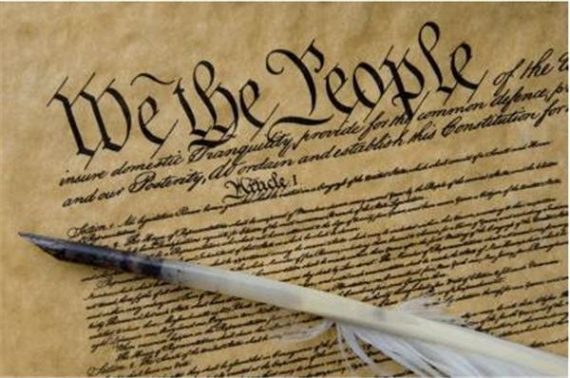A Simple (yet Salient) Observation on the Seventeenth Amendment
Many seem to forget that it was the states that had to ratify the 17th Amendment.
Whenever the 17th Amendment is brought up, it is invariably the case that someone in the comments of the post that raises the topic will start talking about the states as if the, themselves, have interests separate from the people who live in said states. There are a variety of ways to respond to this assertion, but I think a simple reminder about the way amendments come to be is in order.
To wit: of the 27 amendments to the US Constitution, 26* have have been ratified by a vote of at least 3/4th of the state legislatures. That would include the 17th.
That means that the representative bodies of the states themselves and the institutions who had to give up a power are the ones that ratified this amendment. The notion that the states were somehow robbed of a key power is undercut by the the fact that it was the state legislatures themselves that gave that power up.
Further, as I noted roughly a year and a half ago in a post entitled An Historical Note on the 17th Amendment, the main agitators for the move to direct election of senators came from state governments. Indeed, as I note in that post, the move to directly elect senators may have been the closest we have ever come to the states actively calling a convention as a means of proposing an amendment (a process we have not used during the entire two century+ existence of the constitution).
There is also the fact of the matter that there was a high level of corruption associated with appointed Senators in period prior to the 17th Amendment’s proposal.
As such, most arguments about repealing the 17th amendment are constructed of retro-active fantasies.
—
*Only one, the 21st (which repealed the 18th, the prohibition amendment), was ratified by the process of state level conventions.





Yes, but what are the fantasies?
The states would start appointing more Republican Senators?
If the states voted for the 19th Amendment, they are competent to vote for the 28th Amendment repealing it, just as they voted for the 21st to repeal the 18th!
The first part of fixing a problem is recognizing there is a problem. The first step in fixing a mistake is recognizing that a mistake has been made.
@John Burgess: True, if the states so choose, that is their constitutional right,
My point, however, has more to do with the narrative that is offered by those that want to repeal the 17th, which is based, at least in part, on the notion that the states were somehow robbed. A difficult proposition if the states themselves are the ones that initiated and endorsed the change.
And why is it a “problem/mistake” for senators to be directly elected?
Probably the same folks who believe when the 10th Amendment says this:
They think that means the states only and not the people…
@An Interested Party:
I have to quantify this as only a response… not necessarily my own belief:
The problem exists because of the design of the senate. That being a direct reflection of the State’s government. Almost as if the governors were playing that role – and able, with equal power to every other state, to address issues coming out of the house.
The house is the people’s voice. Many districts exist within single large cities, while some districts expand throughout several counties within a state. Loosely following the 1 representative per x amount of people model laid out. If memory serves, we would actually have about 7,500 reps if we had followed this more closely.
anyway, when a popular vote determines your senator(s), it tends to be more a reflection of the larger cities, or more closely matching the house as opposed to being reflective of the state’s opinion.
One could certainly argue that a general election should still reflect the state… but in general the problem is that the house and senate are more closely matched and thus more able to pass measures quickly.
Why arse around (as the Brits might say) why not get to the point and eliminate the Senate. We could replace it with a second house composed of the CEOs or other corporate officer from the largest 100 US corporations. So much more efficient. Why force corporations to buy Senators when they could simple be Senators?
@Steven L. Taylor:
That doesn’t necessarily follow. People are robbed every day of their own “free will”. That’s what swindlers do. I am not necessarily saying that the 17th amendment was a swindle, but the argument could be made that the states thought they were voting for something that turned out to be quite different from what actually turned out to be.
-Polaris
@NickNot: Thank you for clarifying the problem, which seems to be all those terrible people in the big cities — that is, the vast majority of the citizenry — being allowed to have a voice in the way the country runs. We all know what kind of people live in those cities, and they’re certainly not Real Americans, right?
The attempt to repeal the 17th amendment is part and parcel with the current Republican attempts to restrict voting to the “right” people — white Republicans.
@michael reynolds:
We can’t, actually. There’s only three things that can’t be done under the US constitution even by ammendment and eliminating equal representation in the Senate is one of them.
@Stormy Dragon: I suppose if we really wanted to change it we could amend the section that makes amending representation in the Senate unamendable to allow changes and then amend the Senate portion.
Frankly, I don’t see your point. If your argument is that the 17th is a legitimate amendment, then… okay, it’s a legitimate amendment. I don’t know anybody rational who disagrees with you, and the past 100 years of Senate history would suggest that you’re right. If your point is that the 17th Amendment must be a good idea if the state legislatures approved it, well, that’s nonsense, as prohibition (the 18th amendment) should make plain. Why make this argument at all?
Likewise, it is unnecessary for proponents of repeal to argue a) that state legislatures have sovereign interests that differ from that of the citizenry writ large, or b) that the entire idea of “separation of powers” is embedded in the original bicameral design of the federal legislature. And given these two points of fact, the 17th Amendment does – as other commenters have pointed out – call the very existence of the US Senate into question:
Given the 17th Amendment, why again, do we have a Senate in the modern era? Or, better yet, why does the US Constitution give specific powers to the Senate (like the confirmation of justices to the Supreme Court) and not the House? Could it possibly be that prior to 1913 the very construction and viewpoint of the Senate was more properly attune to the healthy functioning of federalism?
@Restore Federalism:
I am not arguing that it is good, dead or indifferent. I am pointing out that the state governments in the pre-17th Amendment era found the system flawed, which undercuts the argument/assertion that the states were cheated by the 17th somehow.
This is a non sequitur, insofar as the amendment did not do away with the Senate. To do away with the Senate would require a specific amendment (which is unlikely to pass).
There is nothing about the schemes of representation in question that necessarily make federalism, per se, better or worse (although one is clearly more democratic than the other). I do not accept the argument (because I see not evidence for the position) that federalism functions better under a pre-17th Amendment representational scheme.
I think all this boils down to a handful of issues, including:
1) Whether the states-qua-states have special interests apart from the people living in those states (which is my focus) and,
2) Whether state-appointed senators would produce different kinds of policies than currently is the case (which is typically the goal of those who would prefer this method of selection).
This feels like a straw man – It seems an irrelevant argument for anyone to make. Maybe you can say who is making that assertion, and why? The legislatures voted for the 17th for the same reason they vote for every amendment: State legislators believed that keeping their jobs depended on it. They caved to the populist movement of the time and did what they felt they must, but voting for the 17th amendment doesn’t make it wise. (It should be pointed out that ten states did not vote for it. I understand that the way the amendment systems works, the 17th applies even to those states voting against it, but it nevertheless contradicts the constitutional clause saying that “no State, without its Consent, shall be deprived of its equal Suffrage in the Senate”).
You may be misunderstanding what the 17th does. The Federalist Papers make it clear that in the original constitution, the Senate is the very embodiment of Federalism (sovereign states within a Union). Its purpose is to represent those sovereign states in the affairs of the whole, and to create a critical check on the intemperate passions of the People represented in the House of Representatives, and in being is the very definition of “separation of powers”. So I’ll ask you again: After 1913, why do we need a Senate – aren’t we effectively unicameral? If the Senate still has a purpose, how does its current construction (elected by the exact same people who elect Representatives) reflect it?
Now that’s just silly. As the Federal Government is now quite willing and able to mandate that the states do its bidding (you’ve heard of unfunded mandates, I presume: “you go and raise revenue for projects we require”), then it’s very hard to argue that the states themselves are sovereign, and if they are not sovereign, there is no modern-day American Federalism of any consequence. Sure, the 10th Amendment makes it possible for states to challenge these in court (and which state has time to fight every unfunded mandate?), but before the 17th, states could protect their sovereignty via a political (not judicial) method in the Senate, their appointed representatives. Every bill could be stopped if that bill challenged the states’ wishes to govern their own people. As for today’s system being more democratic, sure it is, and so what? The sustainable system of government created by the constitution wasn’t supposed to be a democratic one, but a mixed system of competing self-interests. After the 17th, there are fewer competing interests, leading to fewer roadblocks to the acquisition of Federal power, more spending, and eventual bankruptcy.
Take any unfunded mandate, and consider if any would pass under the pre-1913 system. Certainly, a few would, but specifically, the federal health care law would never have passed – even in Massachusetts, where they already (and legally) had a similar system), nor would any similar bill that took away the power of the state legislature to govern its own people.
@Restore Federalism: Given your moniker, it is not surprising that we disagree.
@Restore Federalism: BTW, it is rather impossible to say what would, or would not, pass in a hypothetical universe where we selected Senators differently.
Certainly, a few would, but specifically, the federal health care law would never have passed – even in Massachusetts, where they already (and legally) had a similar system), nor would any similar bill that took away the power of the state legislature to govern its own people.
Ah, the old, “conservatives are just in it for the power” meme. Frankly, I grow weary of liberals lazily trying to argue a point by asserting what the opponent’s “primary motives” are, but in this case, it helps prove the fundamental point:
For both liberals and conservatives, politics is about power. It is part of the human condition to amass and use power. The constitution acknowledges this plainly by creating a framework (separation of powers, checks and balances) to limit the acquisition and the use of power (hence, “limited government”), on the premise that consolidated power is easily corrupted, dangerous, and is most often used to limit individual liberty.
Without the 17th amendment, Massachusetts will certainly appoint liberal senators (not Scott Brown), and Utah will certainly appoint conservative senators. I don’t care. The point is this: appointed senators WILL act differently than elected ones because appointed senators come to their own power and position to serve one single purpose: to represent, protect and enhance the power of their state legislature. By doing this, by limiting the size of the federal government, the state governments retain more power, and by keeping that power closer to those they represent, state governments are – by definition – more responsive to the needs of the people.
I don’t care if Massachusetts legalizes abortion, gay marriage, and drugs. I don’t care if Utah outlaws those things. What I do care about – and what the repeal of the 17th Amendment is all about – is restoring a framework that prevents the values of the people of Massachusetts from ruling the people of Utah, and vice-versa. I want a constitutional framework that is morally and fiscally sustainable for 300 million people, and real, political Federalism offers that by providing the greatest amount of freedom for the greatest number of people through responsive local government.
@Restore Federalism:
And this is done by empowering politicians over citizens. Because, of course, the state legislature of a given states knows better the interests of the people than the people themselves.
And odd route to take, I must confess.
Your tone doesn’t translate. What politicians are “empowered over citizens” and what’s wrong with that, again? The very definition of a representative democracy, is that we empower politicians to act on behalf of the interests of others. A representative in the House is empowered with a legitimate authority to act on behalf of his constituents. A Senator (pre-1913) was empowered to act on behalf of his state legislature. A US Secretary of State is empowered (appointed by the president and (pre-1913) confirmed by the representatives of the state legislatures) to act on behalf of the national government. So what’s your point? One alternative is direct democracy – is that what you advocate?
Is that sarcasm? If you’re saying that “the people” know more about how to represent themselves in the national legislature than the state legislatures do, you’re right: That’s why the people are represented in the US House, and the state legislatures (pre-1913) are represented in the US Senate. What the 17th Amendment says is, “the people know how to represent state government interests better than the state legislatures do”, and that’s simply not true.
@Restore Federalism: In the interest of time, let’s just leave it at this: you aren’t going to convince me that appointed Senators will achieve what you claim it will and I am not going to convince you it is a bad idea.
All well and good in the land of free speech and thought,
Cheers.